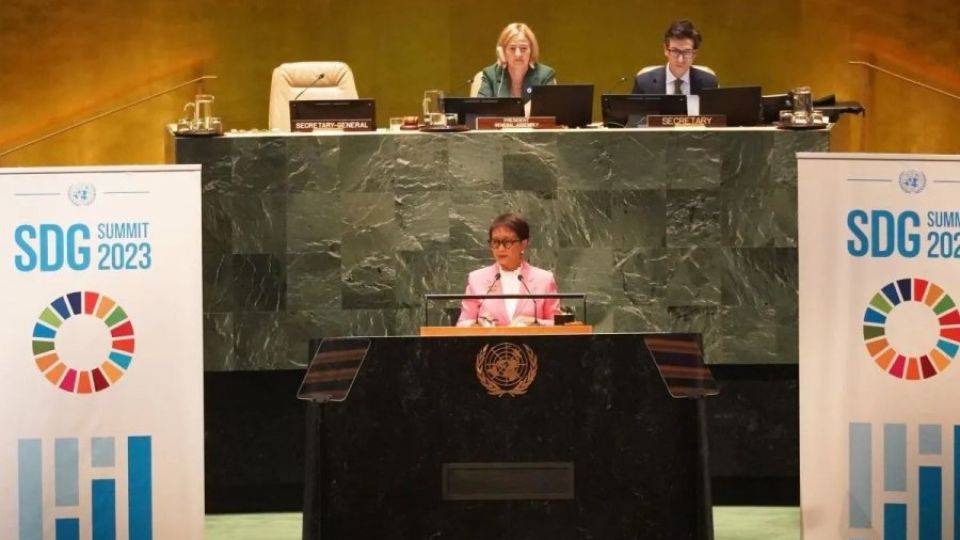September 25, 2023
JAKARTA – In her speeches and press statements at the Sept. 19-26 United Nations General Assembly (UNGA) session in New York, Foreign Minister Retno LP Marsudi has reasserted President Joko “Jokowi” Widodo’s confidence that Indonesia has and will always act as a nonconfrontational and moderate champion of developing nations, now popularly known as the Global South.
Speaking at the plenary session of the Sustainable Development Goals (SDGs), Retno said the current world order was no longer fit to provide equal opportunities to the Global South. As a result, the world is not likely to meet the SDGs by 2030.
As reported by The Jakarta Post from New York, Indonesia’s diplomacy at the UNGA is geared toward strengthening the voice of the Global South.
Retno suggested that developing nations are the most affected by ineffective institutions and are the most prone to debt crises as they face unfulfilled funding pledges from developed countries.
This year’s central theme is “Rebuilding trust and reigniting global solidarity: Accelerating action on the 2030 Agenda and its Sustainable Development Goals towards peace, prosperity, progress and sustainability for all”.
Even with her convincing performance at the podium of the world’s most crucial multilateral session, Retno could hardly make an impact. President Jokowi should have gone himself in order to achieve the maximum impact. His presence at the UNGA session and at bilateral talks with global leaders is crucial if he aims to play the role of the vanguard of the Global South, which he proclaimed during his speech at the BRICS summit in Johannesburg last month.
Jokowi’s quest for a larger global role for Indonesia is unsurprising, after he presided over the Group of 20 in 2022 and has been at the helm of ASEAN this year. He will have another chance to address next year’s UNGA session, a month before he leaves office.
The President’s focus on developing countries is a natural part of Indonesia’s free and active foreign policy doctrine and shows the country’s commitment as cofounder of the Non-Aligned Movement (NAM), which was established in 1961 to protect developing nations from the impacts of the Cold War.
At the global level, Indonesia is often seen as a rival to India in the pursuit of universal recognition as the champion of the developing world. The two were both prominent advocates of the NAM and cultural ties between them have existed for two millennia.
Indonesia’s persistent support of the Global South was evident in Retno’s attendance at the Group of 77 Developing Countries (G77) summit in Havana prior to the UNGA session. During the G77 summit, developing countries renewed calls for a new world order.
The spirit of the G77 is identical to that of the NAM, which promotes equality and an end to the Global North’s world domination.
Despite its intensive efforts at multiple UNGA sessions, the Global South has only been able to file complaints about global injustices and demand the abolition of the veto power of the five permanent members of the UN Security Council (UNSC) as a condition for a new world order.
Developing nations have insisted on enlarging the UNSC’s permanent membership to include the Global South. Indonesia has regularly expressed its bid to become a permanent member as the representative of developing countries, as has India. But these calls remain unheard.
At the UN forum and elsewhere, Indonesia has become a defender of the interests of developing nations through a moderate and nonconfrontational approach. Hostility will only provoke resistance. Cooperation among developing nations must be advanced, as it is not effective to rely on the generosity of developed nations.
Only time will tell if Indonesia’s commitment to playing a leadership role in the Global South pays off.


